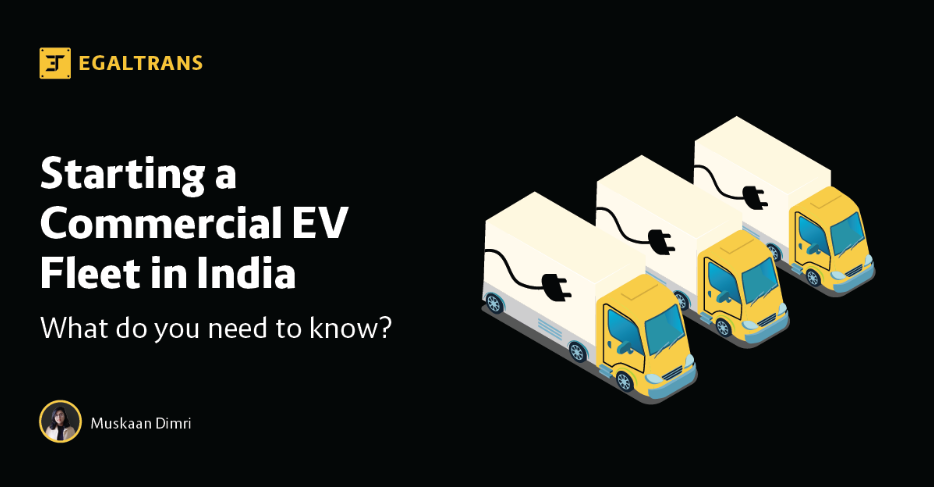In the evolving landscape of the Indian automotive sector, one trend that has been gaining significant traction is the adoption of electric commercial vehicles. This shift, motivated by a drive towards sustainable solutions and an increased emphasis on reducing carbon emissions, is transforming the commercial transportation sector. In this article, you’ll delve into the nuances of this growing trend, exploring the upcoming Commercial EV fleets, benefits, regulations and potential challenges. With an eye on the future, we’ll consider what the electric revolution means for businesses, drivers, and the broader environment.
What are Commercial EV Fleets?
Electric commercial vehicle fleets are groups of commercial vehicles, like trucks, vans, and buses, that are powered by electricity rather than conventional fuels like diesel or gasoline. These fleets are primarily composed of light-duty vehicles (LDVs), such as delivery vans and taxis, and medium- to heavy-duty vehicles (MDVs and HDVs), including trucks, buses, and other larger transport vehicles.
The electric powertrain of these vehicles is what sets them apart. The key components typically include a high-capacity battery pack for storing electricity, an electric motor that drives the wheels, a power electronic controller to manage power flow, and a charging system to replenish the battery.
These vehicles are used in a variety of sectors such as public transport, goods delivery, logistics, construction, and more. Businesses operating these fleets typically use charging infrastructure at their depots or rely on public charging networks, depending on the nature of their operations and the range of their vehicles.

Are EVs Better than Normal Commercial Vehicles?
Electric vehicles (EVs) offer a host of benefits over their conventional counterparts, which make them a compelling option for commercial use over normal vehicles:
- Low Cost of Ownership: Electric vehicles have fewer moving parts than traditional internal combustion engines, which can result in lower maintenance and repair costs. Additionally, electricity is generally cheaper than diesel or petrol, reducing the cost per mile significantly.
- Reduced Emissions: EVs produce zero tailpipe emissions, contributing to cleaner air in urban areas. This is particularly beneficial in India, where many cities struggle with air pollution.
- Noise Pollution: Electric motors are much quieter than conventional engines, reducing noise pollution – a significant benefit in urban and residential areas.
- Energy Efficiency: EVs convert energy from the grid to power at the wheels more efficiently than internal combustion engines convert energy from fuel, which means less energy waste.
- Regulatory Compliance: With increasing environmental regulations and emissions standards, transitioning to EVs can help businesses avoid potential fines and charges. There are several rules which are different in countries and may change region to region but some general one’s include
- Brand Image: Businesses using EVs can enhance their brand image by demonstrating a commitment to sustainability and environmental responsibility.
Despite these advantages, it’s important to also consider the current challenges associated with EVs, such as higher upfront costs, range anxiety, and charging infrastructure limitations. However, advances in technology and supportive government policies are steadily mitigating these challenges.
How to Start and Manage a Commercial EV Fleet
For someone new in the commercial vehicle business, starting and then managing a fleet can be both challenging and tiresome, though it has everlasting benefits.
Starting an electric commercial vehicle fleet involves several steps:
- Assess Needs and Budget: Understand the scope of your operations, the kind of vehicles you need (e.g., delivery vans, heavy-duty trucks, passenger vehicles, etc.), and how many. Estimate the costs, and ensure the investment fits within your budget.
- Plan for Maintenance: Electric vehicles require different maintenance compared to traditional vehicles, including battery health checks and electric motor services. Plan for this in your operations. For eg the fleet manager should be up-to-date with software updates provided by the vehicle manufacturer. These updates can improve the vehicle’s performance, fix bugs, and enhance safety features.
- Get Drivers and Staff: Another difficult step to achieve is to get Electric Vehicle Drivers. They should be trained in a different manner as compared to the normal truck drivers. If not then proper training should be provided firstly before handling them the E-Trucks. Your drivers and mechanics will need to understand how to operate and maintain these vehicles. This might involve formal training or workshops. As many drivers are not well aware about the technicalities of the electric vehicles, training and workshops will help them to increase their efficiencies and work more properly with the correct knowledge of the machines and equipment.
- Implement a Telematics System: Telematics systems can help you monitor your vehicles’ battery status, location, driving behavior, and more. This can help you optimize your fleet’s operation and increase its lifespan. After the fleet is operational, continue to monitor its performance and costs, and make adjustments as necessary.
Remember, transitioning to an electric fleet is a significant decision that can offer many benefits, including lower operating costs and a reduced environmental impact. But it also involves significant up-front costs and logistical considerations, so careful planning is crucial.
Research Incentives and Regulatory Compliance for EV’s
Look into local, regional, and national incentives for electric vehicle (EV) adoption. Many Indian state governments offer subsidies or tax incentives to encourage the transition to clean energy. For eg FAME (Faster Adoption and Manufacturing of (Hybrid &) Electric Vehicles in India): This is a scheme launched by the Government of India to incentivize the production and promotion of eco-friendly vehicles including electric and hybrid vehicles.
Regulatory compliance for commercial EV in India is governed by various laws and regulations enforced by different bodies. As of my last update in September 2021, some of the main requirements include:
- Central Motor Vehicle Rules (CMVR): These are a set of regulations that define the technical and legal requirements for all vehicles in India. Electric vehicles must meet these rules, which include aspects such as safety, design, and emissions.
- Automotive Industry Standards (AIS): AIS are the technical specifications for motor vehicles and their components. They are a part of CMVR and are developed by the Automotive Research Association of India (ARAI).
- Bharat Stage Emission Standards (BSES): Although electric vehicles have zero tailpipe emissions, the production and disposal process might have environmental impacts. Therefore, the Bharat Stage Emission Standards, equivalent to the Euro norms, which every vehicle manufacturer has to adhere to, are crucial. For EVs, this mainly relates to the production, disposal and recycling of batteries and the vehicle itself.
- Homologation Process: Every new model of vehicle must undergo the homologation process, in which it is tested and certified for compliance with the existing regulations. In India, this is carried out by agencies like the Automotive Research Association of India (ARAI) and the International Centre for Automotive Technology (ICAT).
- Battery Standards: India has also defined specific standards for lithium-ion batteries which are used in electric vehicles. These standards (IS 16270) specify safety requirements for the design, construction, and testing of lithium-ion battery packs and systems.
Building an Ideal Fleet Management Team for Commercial EVs
Building an efficient fleet management team to maintain electric commercial vehicles requires a diverse set of skills and expertise. Here are some key roles and responsibilities that should be included in the team:
- Fleet Manager: The fleet manager oversees the entire operation, including vehicle acquisition, maintenance, and performance. They set goals, develop strategies, and ensure compliance with regulations and policies.
- EV Specialist: A dedicated electric vehicle specialist with knowledge of EV technology, charging infrastructure, and battery management is crucial. They can handle specific EV-related issues and optimize the vehicles’ performance.
- Maintenance Technicians: Skilled mechanics with expertise in electric vehicles should be part of the team. They can perform routine inspections, maintenance tasks, and diagnose and repair EV-specific components.
- Charging Infrastructure Manager: This individual will be responsible for planning and managing the charging infrastructure for the electric commercial vehicles. They will ensure that charging stations are strategically located, operational, and well-maintained.
- Data Analyst: A data analyst can analyze the fleet’s performance data, including battery health, energy consumption, and vehicle efficiency. This information helps optimize fleet operations and identify areas for improvement.
- Safety and Compliance Officer: Ensuring safety and regulatory compliance is crucial for the fleet. This team member will monitor and enforce safety protocols and ensure the vehicles meet all legal requirements.
- Customer Support Representative: In case of any issues or emergencies, a dedicated customer support representative can liaise with drivers, stakeholders, and external service providers to resolve problems promptly.
Building a comprehensive team with the right mix of skills and expertise is essential to effectively manage commercial EV and ensure their optimal performance and longevity.
To initiate a Commercial EV fleet in India, it’s imperative to conduct thorough market research, select suitable vehicles, establish a robust charging infrastructure, adhere to regulatory standards, and undertake comprehensive financial planning. Effective training for personnel, forming strategic vendor partnerships, implementing data management systems, and a focused operational strategy will further streamline the process. In conclusion, launching an Electric Commercial Vehicle fleet in India necessitates a holistic approach that encompasses both technical and operational elements, ensuring the fleet’s success in a rapidly evolving transportation landscape.





